|
|
|
Sort Order |
|
|
|
Items / Page
|
|
|
|
|
|
|
| Srl | Item |
| 1 |
ID:
083991
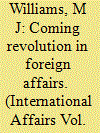

|
|
|
|
|
| Publication |
2008.
|
| Summary/Abstract |
For the last two decades the US has pursued what some analysts have called the 'fantastical idea' of military transformation that would enable the US to change the very nature of war. Known as the 'revolution in military affairs', this process would use technology to provide the US with battlefield dominance that no opponent could overcome. Motivated by the politics of the Cold War, however, this exit from reality has proved less than effective in what has become known as the 'war on terror'. The US has been pulled into nasty, 'small' wars, against enemies utilizing asymmetric tactics. The Bush administration has tried to destroy these groups through the use of military force, failing, or even worse refusing, to recognize that these enemies feed off the economical, political and social rot of weak and failing states. For the last eight years the US government has addressed the symptoms of a problem rather than the actual disease. If America wants to make serious progress with the most pressing national security risks, the next American president must enact a revolution in foreign affairs that sees a massive overhaul and substantial investment in the State Department and USAID. A critical mass of research exists to illustrate the links between development and security-it is time Washington gets serious and embraces a conception of security that is more holistic, and ultimately, more effective.
|
|
|
|
|
|
|
|
|
|
|
|
|
|
|
|
| 2 |
ID:
083992
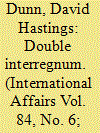

|
|
|
|
|
| Publication |
2008.
|
| Summary/Abstract |
The downturn in relations between the UK and the US under the premiership of Gordon Brown presents an interesting opportunity to analyse the nature of the relationship between the two states. Brown's policy of creating distance between his approach and that of his predecessor, Tony Blair, and between himself and President Bush, offers a case-study in whether it is possible to be cool towards an incumbent leader while remaining close to the state he leads. In other words: is it feasible to be anti-Bush and pro-American? It also provides an opportunity to analyse the role of political timing in inter-state relations. By appearing driven by reaction to the events of 2003 despite taking office in 2007, Brown put himself out of step with the prevailing mood of the time. By also acting as if the Bush administration was a lame duck counting out its time to retirement in 2009, Brown allowed himself to be outmanoeuvred in his bid for America's attention by the conciliatorily pro-American new leaders of France and Germany. By acting as if the Bush administration is a political interregnum, the Brown government has invited the United States to treat his own administration the same way. The result is a dual interregnum in UK-US relations, with each incumbent leader awaiting the political demise of the other before better relations can be resumed.
|
|
|
|
|
|
|
|
|
|
|
|
|
|
|
|
| 3 |
ID:
083998


|
|
|
|
|
| Publication |
2008.
|
| Summary/Abstract |
The Ahtisaari comprehensive proposal for a settlement of the status of Kosovo met with deadlock in the UN Security Council. It would neither be endorsed nor imposed upon the parties. In view of that position, a new round of negotiations, conducted by the EU, Russia and the US, was launched over a period of 120 days. During these discussions, Serbia's President Boris Tadic revealed a significant measure of flexibility when putting forwards options for wide-ranging self-government for Kosovo. However, these forward-looking positions were undermined by a less advanced proposal emanating from other parts of the Belgrade government, including the Prime Minister. Moreover, the Serbian parliament sought to preempt developments by unilaterally adopting its own constitutional amendments relating to Kosovo, further undermining the credibility of Serbia's position at the international level. However, it could be argued that had Belgrade been willing to begin the previous round of negotiations let by Martti Ahtisaari with the advanced offers it was putting at the very end of the process, a different outcome might have resulted. Such action might have put pressure on western governments to impose an advanced autonomy settlement on Kosovo, rather than putting Belgrade under pressure to accept the Ahtisaari plan. In the end, Kosovo's independence was unilateral in two senses. On the one hand, Kosovo declared independence without the benefit of agreement from Belgrade or cover from the UN Security Council. On the other hand, Kosovo unilaterally accepted the provisions emanating from the Ahtisaari talks. These concessions had been made in the expectation that agreed independence would be forthcoming in return. Belgrade was therefore able to oppose independence and work against its consolidation, while profiting from Kosovo's agreement to the plan it had rejected.
|
|
|
|
|
|
|
|
|
|
|
|
|
|
|
|
| 4 |
ID:
083995
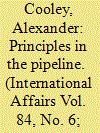

|
|
|
|
|
| Publication |
2008.
|
| Summary/Abstract |
After a decade of relative neglect post-Soviet Central Asia has become a foreign policy priority for the transatlantic community. Both the United States and Europe have engaged with the region in recent years in pursuit of new strategic interests, including maintaining military basing access in support of coalition operations in Afghanistan and securing the export of Central Asian oil and gas to the West. Despite this period of renewed engagement, however, the quality of democratic governance within the region remains poor, especially in comparison with other post-communist regions that successfully completed their political transitions. In fact, the United States and the European Union have often tempered promoting their Central Asian democratization agendas in order to maintain access to these strategically important fixed assets. The transatlantic struggle to balance the pursuit of strategic interests and democratic values has been rendered more difficult by Russia's recent resurgence as a regional power. Backed by the Central Asian governments, Moscow has challenged the purpose and influence of western-based international and non-governmental organizations in the region, thereby further diminishing the transatlantic community's capacity to promote sustained democratic reforms.
|
|
|
|
|
|
|
|
|
|
|
|
|
|
|
|
| 5 |
ID:
083993
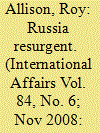

|
|
|
|
|
| Publication |
2008.
|
| Summary/Abstract |
Russia's military incursion into Georgia in August 2008 and formal recognition of South Ossetia and Abkhazia raise fundamental questions about Russian regional policy, strategic objectives and attitudes to the use of armed force. The spectacle of maneouvre warfare on the periphery of Europe could form a watershed in post-Cold War Russian relations with its neighbourhood and the wider international community. The speed and scale with which Russia's initial 'defensive' intervention to 'coerce Georgia to peace' led to a broad occupation of many Georgian regions focuses attention on the motivations behind Russian military preparations for war and the political gains Moscow expected from such a broad offensive. Russia has failed to advance a convincing legal case for its operations and its 'peace operations' discourse has been essentially rhetorical. Some Russian goals may be inferred: the creation of military protectorates in South Ossetia and Abkhazia; inducing Georgian compliance, especially to block its path towards NATO; and creating a climate of uncertainty over energy routes in the South Caucasus. Moscow's warning that it will defend its 'citizens' (nationals) at all costs broadens the scope of concerns to Russia's other neighbour states, especially Ukraine. Yet an overreaction to alarmist scenarios of a new era of coercive diplomacy may only encourage Russian insistence that its status, that of an aspirant global power, be respected. This will continue to be fuelled by internal political and psychological considerations in Russia. Careful attention will need to be given to the role Russia attributes to military power in pursuing its revisionist stance in the international system.
|
|
|
|
|
|
|
|
|
|
|
|
|
|
|
|
| 6 |
ID:
083996


|
|
|
|
|
| Publication |
2008.
|
| Summary/Abstract |
Soaring oil prices since the early 2000s have led to a historic transformation of wealth from consuming regions to major oil exporters. In recent years many of these exporters have set up oil funds to utilize their massive and growing oil revenues. These funds are divided into two categories-stabilizing and saving. Their large investments in western markets have raised concerns that they might be driven by political and strategic interests rather than commercial ones. This article examines oil funds in the Persian Gulf, Norway and Russia. It discusses US and European proposals to regulate oil funds' investments. The article examines the International Monetary Fund's efforts to forge a consensus on a 'code of conduct' that would guide the relationship between oil funds and the recipient markets. The analysis argues against excessive regulation.
|
|
|
|
|
|
|
|
|
|
|
|
|
|
|
|
| 7 |
ID:
083997
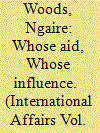

|
|
|
|
|
| Publication |
2008.
|
| Summary/Abstract |
Rising economies including China, the United Arab Emirates, Brazil, Korea, India, Kuwait and Saudi Arabia are subtly changing the rules of foreign aid with profound consequences for the role of multilateral institutions and conditionality. Fears abound that this new aid is bolstering rogue states, fuelling corruption, and increasing the debt burdens of poor countries. This article critically assesses these arguments before dissecting the attractions of emerging donors' aid against a background of established donors' failure to deliver on promises to increase aid, reduce conditionality, better coordinate and align aid efforts, and reform the aid architecture. It argues that a silent revolution is taking place whereby the emerging donors are not overtly attempting to overturn the rules of multilateral development assistance, nor to replace them. Rather, by quietly offering alternatives to aid-receiving countries, they are weakening the bargaining position of western donors. The resulting tensions underscore the urgency of reforming the multilateral aid system
|
|
|
|
|
|
|
|
|
|
|
|
|
|
|
|
| 8 |
ID:
083990


|
|
|
|
|
| Publication |
2008.
|
| Summary/Abstract |
The wars in Iraq and Afghanistan, Bush's unpopularity at home and abroad and the looming threat of recession would have made a gripping drama of the 2008 presidential election campaign even without the ground-breaking emergence of the first credible black and female candidates for the White House. But the defeat of the Democratic establishment's front-runner, Hillary Clinton, by a little-known freshman Senator of mixed ancestry suggested that this was to be the year of the insurgent, just as the Republicans rallied to the least loyal and most contentious of their candidates, the maverick Senator John McCain. The extraordinarily attractive and articulate Senator Barack Obama re-wrote the rule book on winning primaries and caucuses with the help of Silicon Valley and an unprecedented turnout among black and young voters, before veering sharply to the centre once the nomination was secured. Orthodoxy returned at the conventions, with Obama picking a safe centrist as running mate and McCain choosing a Christian conservative, although generating great excitement by nominating a woman and undermining the usual democrat advantage among female voters. And for all the talk of a 'new politics', the year of the insurgents came down at the end, as US elections usually do, to a handful of swing states and the money and organization to win them.
|
|
|
|
|
|
|
|
|
|
|
|
|
|
|
|
|
|
|
|
|